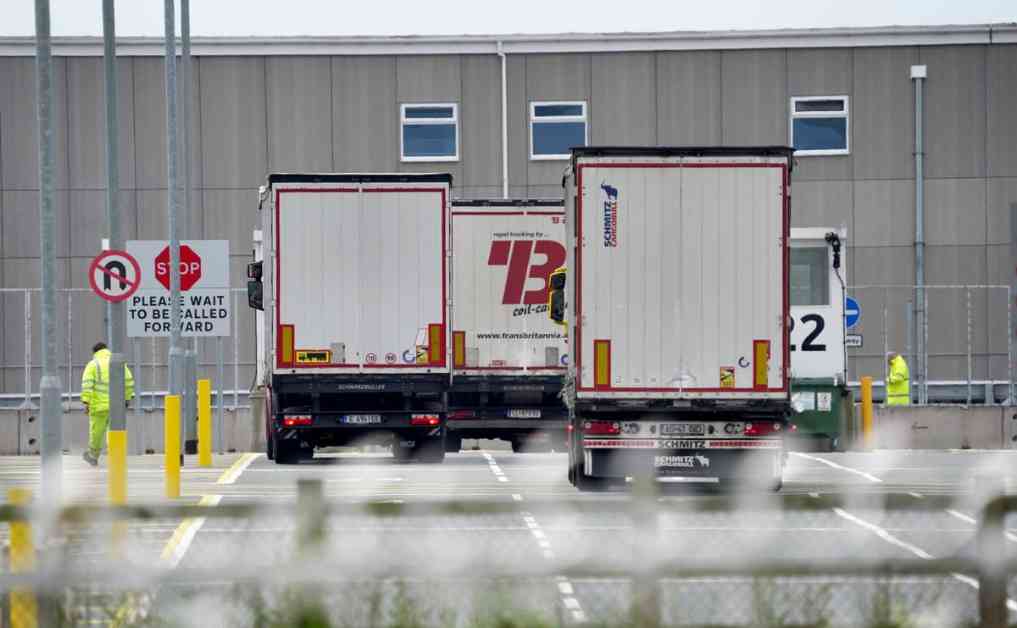Chaotic Post-Brexit Import Controls Spark Criticism and Confusion
In the wake of Brexit, the implementation of new border control systems has led to a wave of errors and confusion among businesses in the UK. Customs agents have raised concerns about businesses being mistakenly charged for goods checks that never actually took place, highlighting significant flaws in the Department for Environment, Food and Rural Affairs (Defra) customs system.
During an online meeting, government officials were confronted with complaints about a consignment that was not unloaded at a government-run border inspection facility in Kent due to a design flaw in the inspection bay. Despite the shipment never undergoing inspection, the owner was still charged for the service, leaving many questioning the efficiency and accuracy of the new customs procedures.
Challenges Faced by Businesses in the Post-Brexit Era
The chaos surrounding post-Brexit import controls has left many businesses struggling to navigate the new requirements and regulations. Customs agent Steve Habbershaw in Dover shared his frustration, stating that he was charged for inspections even though most of his consignments had been cleared electronically without any physical checks taking place. This discrepancy in charges has raised concerns about the fairness and transparency of the customs process.
Prior to Brexit, businesses operated without the need for additional checks and paperwork, making the transition to the new border control system even more challenging. The added costs and complications of full border controls have had a significant impact on businesses importing and exporting goods between the UK and the EU.
Calls for Government Action and Support
As businesses continue to grapple with the challenges of post-Brexit import controls, there have been growing calls for the government to take action to address the issues at hand. Trade groups have warned that the new checks have resulted in higher food prices and reduced margins for importers, putting additional strain on businesses already struggling to adapt to the new regulations.
The introduction of the Common User Charge (CUC) for goods arriving via the Eurotunnel has further exacerbated the financial burden on businesses, with charges potentially spiraling for those importing multiple products in a single load. British importer HunPro highlighted the increased staffing and paperwork required to comply with the new control checks, describing it as a “huge extra expense for nothing.”
Impact on Small Businesses and Industry Associations
The challenges posed by post-Brexit import controls have had a particularly significant impact on small businesses and industry associations. Policy director Sally Cullimore of the Horticultural Trades Association shared the story of a small business member who was hit with a £27,000 bill for the first three months of border checks, representing a substantial portion of the company’s profits.
The Horticultural Trades Association, which represents the UK’s plant nursery industry, has been vocal in its criticism of the new border control system, highlighting the disproportionate financial burden placed on businesses. The lack of tangible benefits from the additional costs has raised concerns about the long-term viability of businesses in the face of ongoing challenges.
Government Response and Future Prospects
In response to the criticisms and challenges faced by businesses, a government spokesperson emphasized the importance of seeking a veterinary agreement with the EU to prevent unnecessary border checks and facilitate the movement of food exports. The government underscored the necessity of risk-based checks on imports to protect national biosecurity and prevent potential outbreaks of disease that could harm food supply chains and the environment.
Despite the government’s assurances, many businesses and industry associations remain skeptical about the effectiveness and fairness of the new border control system. Calls for greater collaboration between the government and businesses to mitigate the impact of the new regulations have been met with mixed responses, highlighting the ongoing uncertainty and complexity of the post-Brexit landscape.
As businesses continue to adapt to the challenges of post-Brexit import controls, the need for transparency, efficiency, and support from the government has never been greater. Only through concerted efforts to address the issues at hand can businesses hope to navigate the complexities of the new customs procedures and emerge stronger in the face of ongoing uncertainty.












